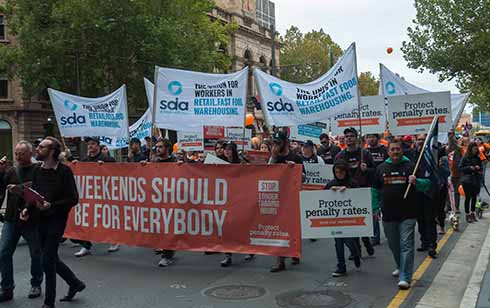 Unions are not corporations. They are ordinary working people coming together collectively in the cause of social justice. They are not perfect, but they are deeply human, writes Dr John Falzon.
Unions are not corporations. They are ordinary working people coming together collectively in the cause of social justice. They are not perfect, but they are deeply human, writes Dr John Falzon.
I have never forgotten that it was the union that was there for my dad when he got cancer from having to use carcinogenic solvents in his workplace at Boral. Neither will I forget the man I recently met who told me, through his tears, that the union was the first to knock on his door after the terrible, and completely avoidable, death of his 21-year-old son in a trench collapse on a worksite.
The union movement embodies that profoundly human principle that we are not alone; that, in the beautiful First Nations proverb that the late Dom Helder Camara was fond of quoting: ‘When we dream alone, it is only a dream, but when we dream together, it is the beginning of reality.’
Martin Luther King understood that union struggles are civil rights struggles. Indeed the reason he was in Memphis at the time of his assassination in 1968 was to support striking garbage collectors.
‘The labour movement’, he said, ‘was the principal force that transformed misery and despair into hope and progress…. The captains of industry did not lead this transformation; they resisted it until they were overcome.’
Unions are self-advocacy organisations. Instead of waiting for someone to speak on their behalf, union members, ordinary working people, organise themselves to collectively advocate for their rights. When governments, at the behest of big business, try to undermine the right of workers to organise collectively, they are attempting to criminalise advocacy.
BUILDING A MORE JUST SOCIETY
The advocacy of unions is not only about protecting and improving the wages and conditions of their members; it is also about building a more just, compassionate and equitable society.
The union movement in Australia has fought for the rights of First Nations Peoples, women’s rights, the rights of LGBTQI people, and the rights of refugees. The First Nations Workers Alliance, for example, is leading the campaign against the racist and exploitative Community Development Program. The union movement is also at the forefront of the call for a First Nations Voice to Parliament, as called for in the Uluru Statement from the Heart.
Workers, through their collective action in the union movement, fought for Medicare, superannuation, long service leave, the minimum wage, annual leave, sick leave, and so much more. Without the union movement there would be no mechanism for workplace health and safety, which seeks to ensure that employers fulfil their obligation to protect workers from injury and death as a result of their work. Workplace sexual harassment, discrimination, bulllying, and the infliction of other psycho-social injuries all fall within this remit.
Unions continue to fight for the right of unemployed workers to an increased rate of JobSeeker, one that does not force them to wage a daily battle for survival from below the poverty line. Unions initiated the Green Bans of the early 1970s, in solidarity with residents to protect both the natural environment and historic buildings from rapacious developers. Unions have joined the global movement for climate justice, supporting the Climate Strike, for example, as well as playing a proactive role in preparing for a post-carbon economy.
I was extremely proud, as a grass-roots union member participating in the March 4 Justice on the lawns of Parliament House in Canberra on 15 March, to see the Australian Council of Trade Unions formally endorsing and practically supporting this cry for justice by women subjected to gendered violence, sexual assault and sexual harassment, and to see ACTU President, Michele O’Neil and Secretary Sally McManus, passionately addressing the crowd.
Unions, like other grassroots social movements for social justice, are simply the organisation of hope, the organisation of the struggle for collective happiness, the organisation of solidarity.
 UNIONS AND CATHOLIC SOCIAL TEACHING
UNIONS AND CATHOLIC SOCIAL TEACHING
Catholic Social Teaching has long been strongly supportive of the right of workers to unionise and of the broader social good that is wrought by their collective struggle for social jus-tice and social change.
More recently, Pope Francis, in an address to the Italian Trade Union Confederation in 2017, observed: ‘The capitalism of our time does not understand the value of the trade union.’ Given, however, that the capitalism of our time is so committed to undermining unions, it is clear that it does understand the threat that the trade union movement poses to unfettered corporate rule.
Francis went on to say: ‘There is no good society without a good union, and there is no good union that is not reborn every day in the peripheries, that does not transform the discarded stones of the economy into its cornerstones. The Italian for “union”, “sindacato”, is a beautiful word: it comes from the Greek “dike”, or “justice”, and “syn”, together: syndike, “justice together.”’
This is an excellent summation of the broadest social role of the union movement. Nothing frightens the oppressor as much as when the despised get organised! Francis spells out how this position finds its roots in the Hebrew and Greek scriptures:
‘The union is an expression of the prophetic profile of society. The union is born and reborn every time that, like the biblical prophets, it gives a voice to those who have none, denounces those who would “sell the needy for a pair of sandals” (cf. Amos 2: 6), unmasks the powerful who trample the rights of the most vulnerable workers, defends the cause of the foreigner, the least, the discarded.’
This prophetic tradition in the Hebrew scriptures, which remain dear to my heart ever since I had the joy of studying them many years ago, is synonymous with the call to social justice and the unremitting struggle against oppression.
THE BIBLICAL IMPERATIVE FOR JUSTICE
Workers have a right to be paid fairly. The trend today, however, under 21st century predatory capitalism, is that of wage stagnation and wage suppression while the cost of living rises, particularly with respect to essential goods and services.
The prophets make no bones about the fact that you cannot be on the side of liberation for the oppressed without critically analysing and removing the structural and historical causes of oppression.
The prophet Jeremiah (22:13) condemns the employer ‘who makes their neighbours work for nothing, and does not give them their wages.’ Ecclesiasticus (34:22) puts this even more strongly: ‘Whoever withdraws the salary of a worker is guilty of blood.’ And later, in the Greek scriptures, we have James (5:1-4) issuing the following warning to wage thieves: ‘Come now, you rich, weep and wail over your impending miseries…. Behold, the wages you withheld from the workers who harvested your fields are crying aloud...’
One of the issues that unions, and other sections of civil society, seek to uncover and confront, is the hyper-exploitation of visa holders as well as the trafficking and modern slavery experienced by women and men brought specifically to Australia for this purpose. Deuteronomy (24:14) is quite specific in addressing this form of oppression: ‘Do not exploit the lowly and the poor daily-wage earner, whether they be one of your brothers or sisters or a foreigner whom you find in your land.’
Consistent with one of the over-riding motifs of the scriptures, that of the primacy of the liberation over libations, the prophet Isaiah (58:3) does not hold back from critiquing employers who profess to be people of faith but who fail to be people of justice: ‘Even while you fast, you keep oppressing your workers.’
Unions, along with those sections of civil society that share their liberatory motivation, continue to stand in the way of unfettered neoliberalism, that destroyer of life and crusher of souls.
As Gangulu artist and writer, Aunty Lilla Watson, has written, encapsulating the core message of both the ancient scriptures and the modern union movement: ‘If you have come to help me you are wasting your time. But if you have come because your liberation is bound up with mine, then let us work together.’
Dr John Falzon (@JohnFalzon) is a poet and sociologist living on unceded Ngunnawal land. He is the author of The language of the unheard (2012) and a collection of poems, Communists like us (2017). He was national CEO of the St Vincent de Paul Society from 2006 to 2018 and is currently Senior Fellow, Inequality and Social Justice at Per Capita.